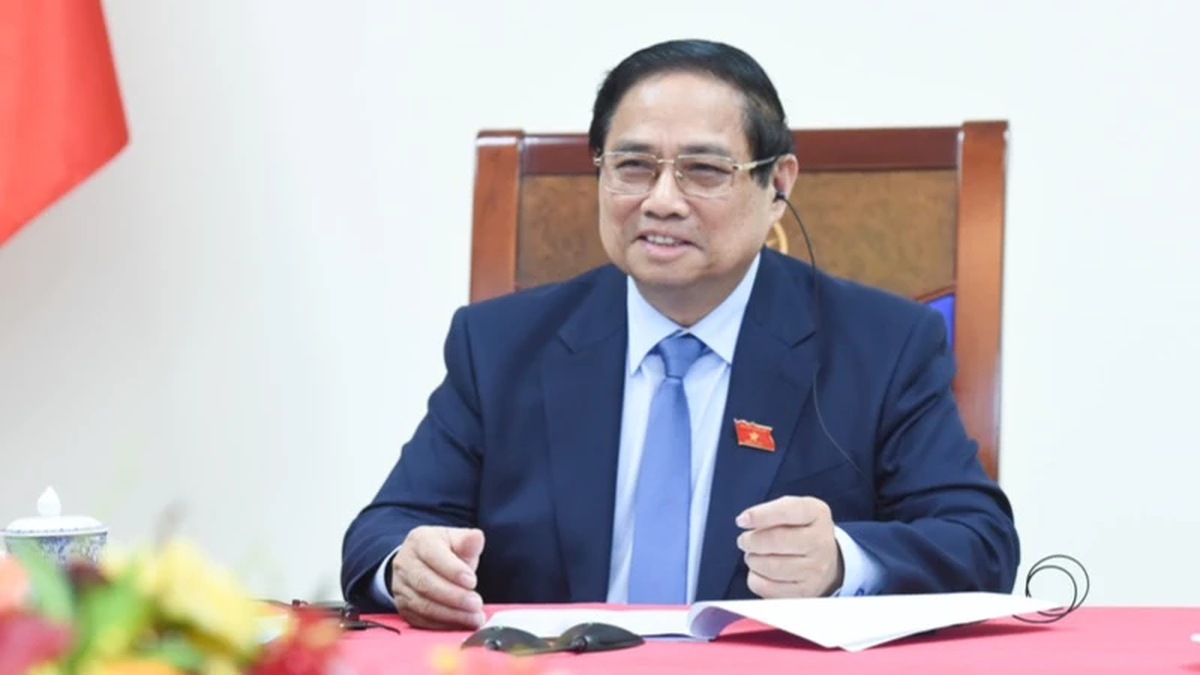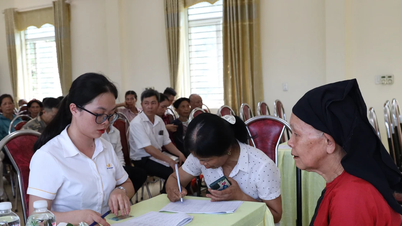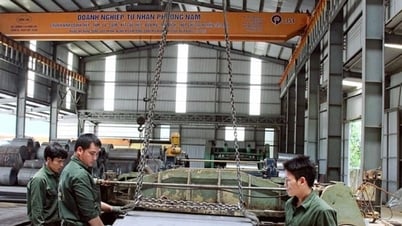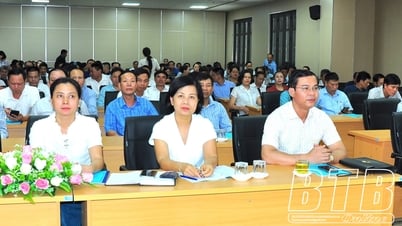Building a professional commune-level apparatus

Discussing at the Hanoi Group on the draft Law on Organization of Local Government Amendments , delegate Bui Huyen Mai (Member of the Standing Committee of the City Party Committee, Secretary of Thanh Xuan District Party Committee) expressed her agreement with the comprehensive revision of the draft Law to promptly institutionalize the Party's policy on streamlining the apparatus and organization of local government according to the 2-level model.
Regarding the delimitation of authority of local authorities at all levels, stipulated in Chapter 3 of the draft Law, delegates agreed with the provisions on delimitation of authority, decentralization, delegation and authorization, which have gradually institutionalized the Party's policies. In the context of no longer having a district level, transferring all authority of the district level to the commune level is necessary...
Article 39 of the draft Law stipulates the organizational structure of the People's Committee at the commune level, allowing the establishment of specialized agencies under it. Regarding this, delegate Bui Huyen Mai agreed and supported it, because this provision is consistent with the transfer of authority from the district level to the commune level.

Delegates proposed to add regulations to expand the authority of the People's Committees of large cities, such as Hanoi and Ho Chi Minh City, to flexibly organize specialized agencies in accordance with the characteristics of urban management. For example, with the population size of some wards in Hanoi reaching up to 100,000 people, the organization of specialized agencies is very necessary.
“At the same time, it is necessary to give more authority to the provincial level, specifically the City People's Committee, to proactively arrange staff and civil servants based on workload and population size, in addition to current regulations on the number of vice chairmen of the People's Committee at the commune level,” delegate Bui Huyen Mai suggested.
Discussing the organization and operation of local governments, delegate Ta Thi Yen (Dien Bien Delegation) requested the drafting agency to calculate and explain more specifically the reasons and basis for proposing the number of People's Council delegates at provincial and communal levels as in the draft Law.
According to the delegate, the proposed number of People's Council delegates must ensure the correlation between administrative units that are reorganized and those that are not. At the same time, it must be consistent with the policy of streamlining the apparatus and reasonably reducing the number of People's Council delegates in the current period.

"It is recommended that the number of People's Council delegates at the commune level be proposed based on population to suit the reality of each locality and ensure fairness," delegate Ta Thi Yen suggested.
Concerned about the organizational structure of the People's Committee at the commune level (Article 39) of the draft Law, delegate Dang Bich Ngoc (Hoa Binh Delegation) suggested that the drafting agency study and supplement strict regulations on the establishment of specialized agencies at the commune level, standards for establishing departments, the number of department leaders, and the number of staff when implementing a two-level local government.
Delegate Dang Bich Ngoc said that the policy of allowing the People's Committees at the commune level to organize 4 specialized departments and equivalents, if not strictly regulated, is not consistent with the direction of streamlining the apparatus, reducing focal points, and reducing intermediate levels in performing public duties.
Annual civil servant salary review for timely adjustment
Discussing the draft Law on Cadres and Civil Servants (amended), delegate Tai Dinh Thi (Hanoi Delegation) was interested in the job positions and civil servant ranks in Section 3, Chapter 4. The delegate requested the drafting agency to study and evaluate the impact carefully to ensure feasibility.

According to the delegate, the current Law has stipulated job positions but the implementation is still confusing. The draft Law continues to stipulate job positions including civil servant ranks, but the management mechanism combining title standards, job positions and staffing quotas is unclear. Therefore, the delegate requested the drafting agency to clarify this relationship to avoid overlap and ensure feasibility.
Regarding the evaluation of cadres and civil servants in Article 19, delegates recommended that there should be specific regulations on the application of an evaluation mechanism based on key performance indicators (KPI) and collecting feedback from people and businesses. According to delegates, this mechanism will ensure transparency, clarity and is a premise for other stages in personnel work such as appointment, reward or discipline.
“We request that the drafting agency complete the regulations to ensure the rights and motivation of cadres and civil servants with a fair salary and bonus policy linked to performance and working conditions. Referring to the experience of Japan and Singapore, we need to evaluate civil servant salaries annually to make timely adjustments, ensuring competition with the private sector, thereby creating motivation for cadres and civil servants,” the delegate suggested.
Regarding the policy for talented people in public service in Article 5, the current regulation assigns the Government to specify details, but delegates are concerned that if there are no specific regulations in the Law, preferential policies will lack feasibility, especially when there is overlap with other laws.

Discussing at the Yen Bai group, Minister of Home Affairs Pham Thi Thanh Tra said that the amendment of the Law on Cadres and Civil Servants is an opportunity to comprehensively change the thinking and philosophy of our country's civil service and civil servants. In which, the job position is clearly established, because this is the tool, the thread throughout, the center, the core for recruitment, use, management, training, reward, and discipline.
According to the Minister, this amendment still retains the civil servant rank in the job position. This is considered a technical tool to define the hierarchy for our country's public service, if it is removed it will be very difficult to define. "We still retain this rank to deploy and implement salary reform. If the civil servant rank is removed it will be very difficult to design issues related to mechanisms and policies," said the Minister.
The Minister also said that we must overcome the mindset of lifelong tenure. Because if we are in the tenure system and are firmly in the position, there is no way we can leave the tenure system. Therefore, we must design it so that there is entry and exit, and we must completely abolish lifelong tenure.
To do so, two tools must be implemented, including assessment based on job positions and using contract mechanisms (contracts for experts, scientists, job positions). This is a common trend in the world, which has been satisfactorily explained to the Government. "In the near future, a separate decree on assessment will be issued, with KPIs and data for assessment, using work products as a measure, not general qualitative assessments," the Minister informed.
Source: https://hanoimoi.vn/dai-bieu-quoc-hoi-de-nghi-mo-rong-tham-quyen-cho-ubnd-cac-do-thi-lon-701509.html




![[Photo] National Assembly Chairman Tran Thanh Man chairs the meeting of the Subcommittee on Documents of the First National Assembly Party Congress](https://vphoto.vietnam.vn/thumb/1200x675/vietnam/resource/IMAGE/2025/5/8/72b19a73d94a4affab411fd8c87f4f8d)
![[Photo] Prime Minister Pham Minh Chinh meets with the Policy Advisory Council on Private Economic Development](https://vphoto.vietnam.vn/thumb/1200x675/vietnam/resource/IMAGE/2025/5/8/387da60b85cc489ab2aed8442fc3b14a)
![[Photo] General Secretary concludes visit to Azerbaijan, departs for visit to Russian Federation](https://vphoto.vietnam.vn/thumb/1200x675/vietnam/resource/IMAGE/2025/5/8/7a135ad280314b66917ad278ce0e26fa)
![[Photo] President Luong Cuong presents the decision to appoint Deputy Head of the Office of the President](https://vphoto.vietnam.vn/thumb/1200x675/vietnam/resource/IMAGE/2025/5/8/501f8ee192f3476ab9f7579c57b423ad)

















































![[Photo] Prime Minister Pham Minh Chinh talks on the phone with Singaporean Prime Minister Lawrence Wong](https://vphoto.vietnam.vn/thumb/402x226/vietnam/resource/IMAGE/2025/5/8/e2eab082d9bc4fc4a360b28fa0ab94de)





























Comment (0)